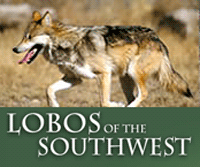PLEASE SPEAK UP FOR WOLVES IN THE 10(j) MANAGEMENT RULE SCOPING COMMENT PERIOD
The U.S. Fish & Wildlife Service (FWS) issued a request for comments on April 15, 2020, beginning a 60-day period for the public to provide input on the proposed changes to the 10(j) Management Rule. This rule directs many aspects of how the FWS fulfills its obligation to recover the Mexican gray wolf to a sustainable wild population.
Mexican gray wolves need you to make the argument that a suite of changes MUST be made to ensure their survival in the wild.
What is the “10(j) Management Rule”?
The U.S. Fish & Wildlife Service is responsible for implementing the Endangered Species Act (ESA), a powerful law that is intended to protect threatened wildlife and plant species from extinction. The FWS uses a particular management tool (listed in Section 10(j) of the ESA) when a species is being reintroduced to a landscape that it has been wiped out from. It gives the FWS more flexibility (not always the good kind) to adapt the Endangered Species Act regulations to better fit the demands of bringing a species entirely back from the brink. You can read more about it here.
Why are they doing this now?
The FWS tried to make changes to the 10(j) rule in 2015. (Endangered and Threatened Wildlife and Plants; Revision to the Regulations for the Nonessential Experimental Population of the Mexican Wolf ; Federal Register/Vol. 80, No. 11/Friday, January 16, 2015, pp.2512-2567) However, the changes they proposed would have led to a bleak future for lobo recovery. And as a result, conservation organizations immediately sued the U.S. Fish & Wildlife Service for not fulfilling their obligation to bring Mexican gray wolves back to a healthy wild population. The court swiftly agreed with the groups. In April 2015, U.S. District Court Judge Jennifer Zipps came back with an order for the FWS to redo the process of changing the management rule and this time include honest interpretations of the best available science. (You can read more about the 2015 court ruling here.) This was a major victory for lobos. And though the wolves have had to wait years for the process to be reinitiated, the time has come for us to begin a new chapter in the story of lobo recovery. The following points are some of the key priorities that will guide that next chapter.
What needs to be included in new rule to ensure Mexican wolves are recovered in the wild:
- The FWS must designate Mexican gray wolves as essential. Lobo recovery efforts will benefit from losing the outdated status of “nonessential.” The wild population plays a critical role in the genetic health of the overall population; the loss of any wild Mexican gray wolf from the overall gene pool jeopardizes the recovery effort. Designating wild lobos as essential acknowledges the scientific communities’ recommendations.
- There shall be no cap or maximum number of Mexican wolves allowed in the wild. Additional populations of reintroduced wolves are necessary for the survival of the wild population.
- The recent increase of removing and killing wild Mexican gray wolves must end. The following parameters need to be included in the management rule:
- Wolves shall not be removed from the wild for their predation on wildlife such as elk or deer.
- Authorization for either the government or private individuals to kill wolves is restricted to cases in which they pose a likely threat to human health or safety.
- Wolves shall not be removed from the wild for preying on livestock on public lands if the permittee knowingly leaves cattle unattended near wolf packs.
- Mexican gray wolves belong in the Grand Canyon region and southern Rockies. Wolves shall not be removed from the wild because they roamed beyond any geographic boundary, and in particular wolves shall not be removed from the wild for traveling into or inhabiting regions north of Interstate Highway 40. The FWS needs to establish two additional core populations in these areas.
- Mexican gray wolves belong in Mexico too. Wolves shall not be removed from the wild for preying on livestock south of Interstate Highway 10 in Arizona and New Mexico, in order to facilitate natural connectivity between wolves in the U.S. and in Mexico.
- Wolves need freedom from boundaries. Given room to roam, the wolves will establish themselves in suitable areas with adequate game. The FWS must be proactive in support of wolves to establish new packs and populations in additional areas. Capturing and containing wolves is always a risky business that can result in death or trauma to the wolf.
- Wolves once lived throughout Arizona and New Mexico and played a critical role in keeping the balance of nature in place. We need to restore this important animal that has been missing for too long.
Speak up for the wolves!
Submit your comments to the Fish and Wildlife Service HERE.
You may submit written comments by one of the following methods:
(1) Electronically: Go to the Federal rulemaking Portal: http://www.regulations.gov. Follow the instructions for submitting comments to Docket No. FWS-R2-ES-2020-0007, which is the docket number for this notice of intent.
(2) By hard copy: Submit comments by U.S. mail or hand-delivery to: Public Comments Processing, Attn: FWS-R2-ES-2020-0007; U.S. Fish and Wildlife Service, MS: PRB/PERMA (JAO/1N), 5275 Leesburg Pike, Falls Church, VA 22041-3803.
Deadline for public comments is June 15, 2020 by 11:59 pm ET
Don’t worry if this is the first time you’ve written official comments to a federal or state agency. The most important thing is that FWS hears that wolf recovery is important to you and the outcome of this process should support their future.
Mexican wolf advocates will be hosting a two-part webinar in May. If you would like to learn more about the history of Mexican gray wolf recovery and tips on how to write a letter that will make a significant difference during the public comment period, please sign up for the webinars below.
Mexican Gray Wolf Recovery: The First Twenty-Two Years
The first webinar will be covering the history of wolf extermination in the West and the remarkable effort to begin recovering the wild population from a small group of captive wolves. You'll learn about the importance of genetic health in wild lobos and the role of a healthy wolf population in returning balance to our desert and forest ecosystems.
Thursday, May 14th, 5:30PST/6:30MDT
Watch the first webinar recordings
Featuring guest wolf advocates Dave Parsons (Project Coyote),
Tre Graves (Endangered Species Coalition) & Jean Ossorio
Mexican Gray Wolf Recovery: The Next Chapter!
Following the first webinar, we will continue into the current status of the Mexican gray wolf and recovery efforts. This webinar will discuss various policy opportunities that can come of the current 10(j) management rule change. We'll also present some tips on how to write your comment letter to help build a case for these changes, ensuring a future that includes wild wolves!
Tuesday, May 19th, 5:30PST/6:30MDT
Watch the second webinar recordings
Featuring guest wolf advocates Emily Renn (Grand Canyon Wolf Recovery Project),
Roz Switzer (Great Old Broads for Wilderness), & Chris Smith (WildEarth Guardians)





